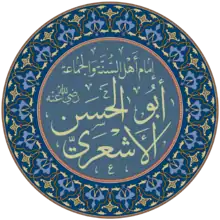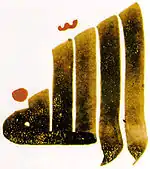Ahmad al-Rifaʽi
Al-Rifaʽi (1118–1181/2, full name Ahmad ibn ʿAlī Ar-Rifāʽī أَحْمَد ابْن عَلِي ٱلرِّفَاعِي) was the founder of the Rifai Sufi order.[1][2][3] His tomb and shrine is located in southern Iraq, and is different from the one announced destroyed by the ISIS terrorists in 2014. However, another shrine for him is located in the Al Rifaʽi Mosque in Egypt.
_52_%D9%83%D9%85_%D8%B4%D8%B1%D9%82_%D9%85%D8%AF%D9%8A%D9%86%D8%A9_%D8%A7%D9%84%D8%B1%D9%81%D8%A7%D8%B9%D9%8A.jpg.webp)
| Part of a series on Islam Sufism |
|---|
|
|
| Part of a series on |
| Sunni Islam |
|---|
 |
|
|
Biography
Shaikh Ahmed er-Rifaʽi was born in Hasen Region of Wasit, Iraq, during the first half of Recep of lunar months. When he was seven years old, his father Sayyid Sultan Ali el-Betaihi died in Baghdad. After that his uncle Sayyid Mansur ar-Rabbani el-Betaihi took under his protection and educated him.
He learnt the Quran from Shaikh Abd üs-Semi el-Hurbuni in Hasen, his birthplace. He committed to memorizing the whole of the Quran at the age of seven. During the same year after the death of his father, his uncle Mansur el-Betaihi transferred him and his family to Dikla region. There, his uncle sent him to Ebul Fadl Ali el-Vasiti who was an expert in the canon law of Islam, a commentator on the Quran and a preacher.
On the other hand, when he was attending dhikr meetings of his uncle Shaikh Mansur er-Rabbani, he was also attending the courses of his other uncle Shaikh Ebubekir who was a major scientific figure at the time. He memorized the book "Tenbih" concerning Fikh (Muslim canonical jurisprudence) of Imam Shafi which belongs to Imam Ebu Ishak Sirazi. He also wrote an explanation about such book (this explanation was lost during the Mongol invasions however).
He dedicated his entire time to learning such religious knowledge to such an extent that eventually even his teachers respected him.
When he was twenty, Ebu Fadl Ali, the Sheikh of Wasit province and his teacher, awarded him a "Sehadetname" (which represented writings of evidences including canonical law and order of dervish sciences), and a nickname that was the father of external and interior sciences, and also dressed him in his own dervish's cloak.
He stayed in Nehr-i Dikla for a short time and after that he came back to his father's public guest-house for travelers at Hasen during which time he became very famous. When he was twenty-eight, his uncle Shaikh Mansur bequeathed him to manage the dervish lodge and Caliphs after his death. He also commanded him to live in dervish lodge of Shaikh Yahya en-Neccari who was his grandfather from his mother side. It was during this time he began to preach in this dervish lodge. His uncle died in the year of the bequeathing. When he was thirty-five, the number of his murids was over seven hundred thousand.
He did not neglect teaching the Sunnah of Prophet Muhammad and the details of the Quran to the public as he always believed that the trade of a wise man was to show the way towards God.
He gave courses in hadith, canonical jurisprudence, religious precepts and commentary on the Quran (Tafsir) everyday except for Monday and Thursday. He sat in his pulpit afternoons on Monday and Thursday and preached to intellectuals and the public.
There is an information in the book which is called "Sevad ul-Ayneyn" of Imam Rafii. The writer says that:
"Shaikh Salih Yusuf Ebu Zekeriya el-Askalani, who was a great expert in the canon law of Islam, had told me that: I had gone to Ummi Abide to visit Shaikh Ahmed er-Rifaʽi. More than one hundred thousand people crowded around the guesthouse, some people were managers, scientists, sheikhs and the other members of the public. He provided dinner to all of them and was very friendly to everyone. He started to preach in the afternoon of a Thursday. Preachers of Wasit province, a religious community from doctors of Muslim theology of Iraq and the important people of the province attended the preach meeting. One group of them asked for science of commentary on the Koran, the other group asked for subjects interested with record of sayings of the Prophet Muhammad, the other group asked for Muslim canonical jurisprudence, another group asked for the disagreement between the different religious opinion, and the other groups asked too many questions about different sections of science. He answered more than two hundred questions, and he experienced no anger during his answering of questions. I became embarrassed because of the insensitiveness of people asking questions, and I stood up and said them that; "Is this not enough for you? He will answer all questions about the written sciences, not facing any difficulty, with the permission of Allah." Because of my words he smiled and said to me that; "Ebu Zekeriya allow them to ask before they lose me. Certainly the world is a house which will become absent. Allah changes whole situations every time." The people cried because of his answer. The meeting was confused, worried sounds were heard. Forty thousands people became students of him with the spiritual effect of his talk."
Ahmad Rifaʽi's talks, his moves, his behaviors and his every breath were for Allah. He had got always a smiling face and he was modest, good-tempered, enduring suffering, very patient. He didn't become cross with anyone and didn't want any help for his own personality. On the contrary, he loves for Allah, and anger for Allah. He doesn't rebuke somebody who behave that he doesn't like. He doesn't see his family and himself superior to other people. Even he said about this subject that; "According to our opinion for Allah, everybody is equal to each other, it doesn't matter they are close relative or unknown people for us."
He used to want from people protect themselves overusing the things that neither recommended nor forbidden by religious law like that overeating and oversleeping. He used to recommend doing worship during the nights. He also used to recommend being far away from people who doesn't know their limit, behave in excessive manner, see themselves superior to others and dispute each other.
He used to do his service by himself, repair his shoes, carry the firewood prepared for him to the house of people who are sick, orphan, fallen and without relations or friends.
He used to turn shoes of blinds, and also take away them to the place that they want to go. He used to respect old people and recommend respecting them.
He used to go to the house of leprous and bedridden people, wash their clothes, bring their meal, sit and eat with them, and wanted them to pray for him. When he heard a patient in his city in a far city, he used to visit them. He also cure the wounded animals, and he said that; "To compass the creatures of Allah is one of the reasons that human being are close to Allah."
He used to behave very mercifully to orphans, cry for poor people, grow merry with their joy, behave with them with modesty, see himself like one of them and say in meetings that; "If a whole craft owner is a count and every craft owner passes in groups, I prefer to become a poor in the groups of poor."
Great people of his era said that; "The most important reasons of reaching his great place is his great mercy to all creatures and his looking self down to himself."
He used to respect the wise and experts in the canon law of Islam and wanted everybody to respect them by teaching that; "The wise are the leaders and fundamentals of the community."
He had withdrawn from world. He did not store any commodity at any time. Although he possessed big wealth, he did not wear two sets of clothes at the same time, neither in the summer nor in the winter. His movable and immovable property was much more than property of governors and famous rich men. He used to distribute the revenue of his real estate to dervishes and people who come to dervish convent. He did not leave any commodities to his children."
References
- Bosworth, Clifford Edmund (1997). Rifaʽiyya. The Encyclopaedia of Islam. Brill. ISBN 978-90-04-10422-8.CS1 maint: ref=harv (link)
- Margoliouth, D.S (1997). Bosworth, Clifford Edmund (ed.). al-Rifaʽi b. ʽAli, Abu 'l-Abbas. The Encyclopaedia of Islam. Brill. ISBN 978-90-04-10422-8.CS1 maint: ref=harv (link)
- Trimingham, Beirut J. Spencer (19 May 1998). The Sufi Orders in Islam. Oxford University Press, USA. ISBN 978-0-19-802823-9.

